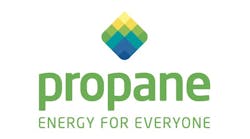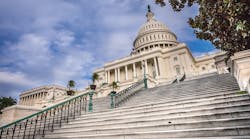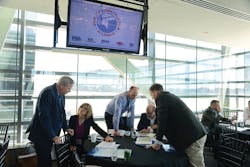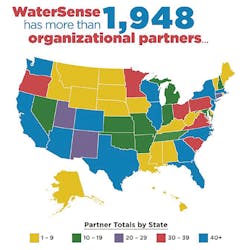Latest from Green
Sloan Achieves WAVE Program Reverification
Sponsored
Advocacy is defined as “the act or process of supporting a cause of proposal.” The role of advocacy is one taken by many groups and associations. Contractors in the plumbing, heating and cooling industry have several associations that advocate for them on local, state and national issues that affect their businesses, whether its regulations, taxes, code issues, energy efficiency or water conservation.
The most recent “win” for plumbing group advocacy is the reauthorization of the Environmental Protection Agency’s WaterSense program, which is funded at fiscal year 2017 levels as part of a $1.3 trillion government spending bill passed by Congress and signed by President Donald Trump. However, that spending bill only went through Sept. 30 and President Trump has said he will risk a government shutdown if his budget priorities are not met.
“WaterSense has been under threat because it costs money,” explains Dain Hansen, senior vice president of government relations of the IAPMO Group and chair of the High Performance Building Coalition (www.hpbccc.org). “It’s an expenditure by the federal government, about $3 million per year. When the Trump administration came in, its goal was to shrink government and cut government spending. They didn’t look at programs in detail. They looked at all government programs and started to take a hatchet rather than a scalpel to some of them. Every federal program was under fire, even the very popular Energy Star program.”
The big sticking point for WaterSense is that it is not an authorized by Congress. The EPA created the program in 2006 because of such widespread support in the industry, by environmental groups and states dealing with severe drought.
“If it’s not officially sanctioned, if you will, by Congress, then it causes problems in the long term,” Hansen says. “It’s easier for a nonauthorized program to go away because it’s not statutorily locked in the books of the government that it should exist.”
Building relationships
Once the administration set its sights on WaterSense in early 2017, the industry took immediate action met and began drafting coalition letters on saving the program.
“From a sharer investment standpoint, it makes a lot of sense for the federal government to invest in this type of a program because of the long-term benefits for manufacturing, for business, for skilled labor and also for saving water,” Hansen says. “Not only has WaterSense saved water and money, it’s driven U.S. manufacturing and products on a very large scale. The pure payback of WaterSense is exponentially larger than its cost.”
He adds that the coalition reached beyond the plumbing industry and across the political spectrum to gather support — home builder groups, utilities, environmental groups and manufacturers. They drafted very strong language to tell the administration how important the program is and why they didn’t want its funding cut. The Trump administration was still adamant about cutting it from the budget.
As the head of the HPBC, Hansen and others in the coalition began building relationships with key members of Congress, such as U.S. Rep Ken Calvert of California, who is chairman of the Interior Appropriations Committee, the House committee that is responsible for all the EPAs funding.
“We approached some key members of Congress, made the point and talked about the concerns,” Hansen notes. “We have manufacturers who invested a lot of money [in water-saving products.] Organizations such as Home Depot only sell WaterSense-labeled products now. You would have a major disruption within the marketplace if that all went away. We were able to really get the Appropriations Committee, the purse strings of the government, to come out with very strong language. They came out with their report to fund the government that says, ‘We completely oppose the administration’s effort to eliminate the WaterSense program.’
“It’s no secret that this administration is pro-business. And making the business standpoint of why WaterSense is important, not just from the conservationists’ point of view, it’s really held a lot of weight.”
But as the budget considerations come front and center again, WaterSense is again in jeopardy of elimination. There are efforts to get permanent authorization for WaterSense through legislation other than the budget. S. 1137, the Clean, Safe, Reliable Water Infrastructure Bill, would amend the Safe Drinking Water Act and the Federal Water Pollution Control Act to expand the availability of resources for drinking water and wastewater infrastructure projects. The legislation also would provide congressional authorization of WaterSense.
Sen. Ben Cardin (D-Md.) and Sen. John Boozman (R-Ark.), both senior members of the Senate Environment and Public Works Committee, introduced the bill May 16, 2017. Despite accolades from the Plumbing-Heating-Cooling Contractors — National Association and other industry stakeholders, the Senate bill and its House counterpart have sat idle in committee.
Taking a stand
While industry organizations such as PHCC, IAPMO, HPBC and the Mechanical Contractors Association of America spend considerable time with legislators in Washington bringing industry issues to the forefront of discussions, the biggest impact comes from people like you — people who work in the industry, people who have built businesses in the industry and provide good paying jobs that are important to the health and safety of our country.
“I can’t overemphasize it enough, how vital it is to make sure your interests are met,” Hansen explains. “There’s an old saying in D.C., you’re either at the table or you’re on the table. It’s very true when it comes to policy. Policies are drafted, and members of Congress, and policymakers at the agencies, while they aim to do good and they want to pass good policy, they’re not experts in that field. Unless that member of Congress happened to be an engineer or a tradesman or a carpenter, which most are not. They’re relying on experts from the outside to give them the best knowledge that they can to pass the policy.
“If your voice is not represented there, you’re then having to deal with the impact of poor policy down the road because legislation oftentimes doesn’t impact people immediately.”
The easiest way to get involved in your industry is through your associations. Both PHCC and MCAA have legislative fly-ins every year where contractors can meet with members of Congress from their states and discuss the issues affecting their businesses. If you’re concerned with code issues, IAPMO and ASPE have meetings each year and take comments from industry stakeholders into consideration.
If you want to help shape and change your industry, you need to be involved. If you can’t do it personally, send a letter. Or an email. Or call and let your legislators know what your opinion is.
You can do the same with industry groups, letting them know what issues are most important to you and what you would like done on the legislative front.
Take a stand, and make your voice be heard.

Kelly L. Faloon | Freelance Writer/Editor
Kelly L. Faloon is a contributing editor and writer to Contractor, Contracting Business magazine and HPAC Engineering and principal of Faloon Editorial Services. The former editor of Plumbing & Mechanical magazine, Faloon has more than 26 years of experience in the plumbing and heating industry and more than 35 years in B2B publishing. She started a freelance writing and editing business in 2017, where she has a varied clientele.
Faloon spent 3 1/2 years at Supply House Times before joining the Plumbing & Mechanical staff in 2001. Previously, she spent nearly 10 years at CCH/Wolters Kluwer, a publishing firm specializing in business and tax law, where she wore many hats — proofreader, writer/editor for a daily tax publication, and Internal Revenue Code editor.
A native of Michigan’s northern Lower Peninsula, Faloon is a journalism graduate of Michigan State University. You can reach her at [email protected].







